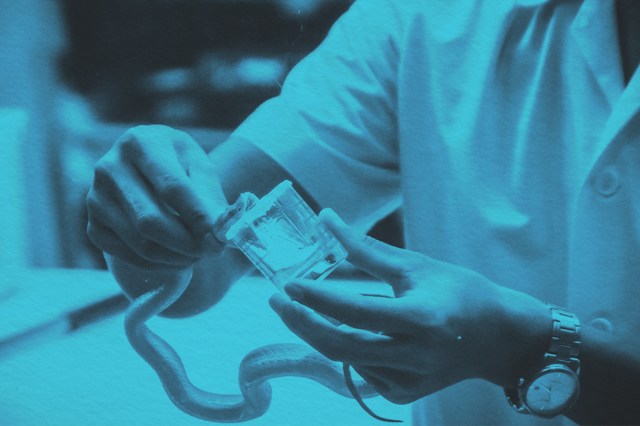
Odd jobs are typically random tasks such as handyperson services, mowing the yard, or running a couple of errands. But then there are unusual careers that give the phrase “odd job” new meaning. It’s not that these professions are any less legitimate but more that the actual title may intrigue you as to what they entail. Some job listings are clearly meant to be tongue-in-cheek, while others have fascinating tasks or the names have an interesting origin story. Here’s a look at a few very real and very weird job titles.
Don’t worry — you’re not going to find snake milk in the dairy aisle. This profession has to do with extracting snake venom. It’s a niche job in the larger field of herpetology — the branch of zoology that focuses on reptiles and amphibians. Milking a snake for its venom is crucial for medical research, as it allows scientists to analyze the substance and explore ways in which a venomous snakebite could be treated. Snake milkers are tasked with humanely handling each snake until it sinks its fangs into a container in which the venom is collected.
Whether you’re named Steve or not, you can apply to become a stevedore, defined by Merriam-Webster as “one who works at or is responsible for loading and unloading ships in port.” The job title is derived from the Spanish estibador, a noun referring to a person who unloads cargo. The Spanish term comes from the Latin stipare, meaning “to cram.”
Yet another unusual title for an animal-related profession is “chicken sexer.” The genitals of a newborn chick look similar no matter the sex, and it can take weeks for a layman to determine whether it’s a male or a female. But chicken sexers are highly skilled and can accurately determine the sex of a newborn chicken within a day or two of birth. According to a report from Vice, a trained person in this field is able to sex (classify) more than 1,000 chicks per hour with 98% accuracy, making the role particularly valuable on large commercial farms.
You may have come across job listings for a “sales guru,” an “SEO guru,” or hundreds of other roles with the word “guru” tacked on to the title or in the job description. In the traditional sense, the word is derived from the Hindi guru and Sanskrit guru-s, both meaning “teacher” or referring to a spiritual guide. But as defined by Merriam-Webster, a guru, as the word developed in English, can also be “a person with knowledge or expertise.” The word saw a steady increase in English usage from the 1960s to the 2000s, and then an especially steep increase from 2014 to today, reflecting the current trend of job identification. The intent is likely to help a job listing stand out and catch the eye of potential applicants, but we may have reached “guru saturation.”
“Philately” is the technical term for the hobby of stamp collecting, but a philatelist can turn this hobby into a lucrative career. The term was coined in 1865 by Georges Herpin — a French stamp collector — and combines the Greek phil- (“loving”) and atelēs (“free from tax of charge”). In addition to collecting stamps, philatelists can earn a good living by studying stamps, trading stamps, or even amassing and selling stamps to collectors at local trade shows and auctions.
While being a lollipop person may sound like a sweet gig, it has nothing to do with confections. Among Australian, British, and Irish English speakers, “lollipop person” is a colloquial term for a crossing guard. It has to do with the large sign they hold, which looks like a brightly colored lollipop on a stick. According to Merriam-Webster, the term dates to the late 1960s.

















